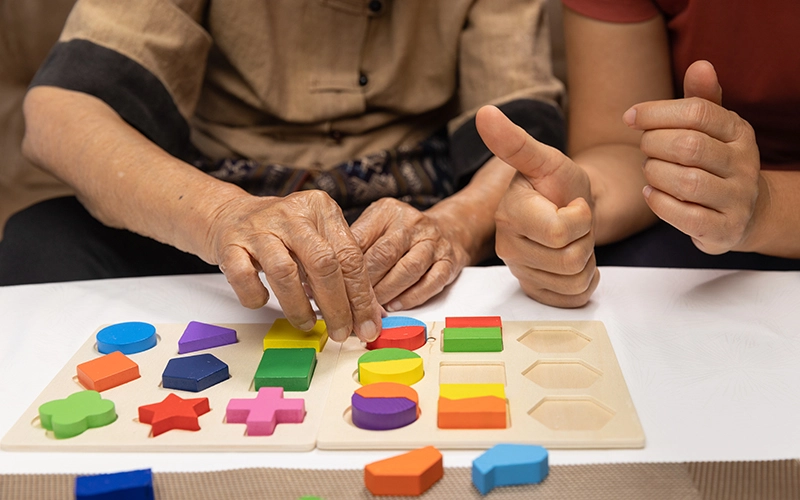

In this article
ToggleIn today’s rapidly evolving healthcare landscape, the demand for occupational therapists is skyrocketing, and statistics reflect this upward trend of Occupational Therapy Scope. According to the Bureau of Labor Statistics (BLS), the employment of occupational therapists is projected to grow by 16% from 2020 to 2030.
This surge in demand not only underscores the significance of occupational therapists in addressing the evolving healthcare needs but also highlights the benefits of pursuing a BSc in Occupational Therapy.
The comprehensive training provided in a BSc in Occupational Therapy equips graduates with the skills and knowledge necessary to meet the expanding demands of the healthcare industry. As the population ages and healthcare priorities shift, the versatility of occupational therapists becomes increasingly invaluable. The projected growth in employment opportunities not only ensures job security for graduates but also presents a myriad of avenues for professional development and specialisation.
The Soaring Demand and Its Key Contributors
This surge in demand is attributed to various factors, such as the ageing population, an increase in chronic conditions, and the expanding role of occupational therapists in addressing mental health challenges.
The baby boomer generation’s ageing has led to a higher prevalence of age-related conditions, while the rise in chronic health issues necessitates ongoing therapeutic interventions. Furthermore, the growing awareness of early intervention for developmental issues in children has increased the demand for pediatric occupational therapy services.
Against this backdrop, pursuing a Bachelor of Science in Occupational Therapy (BSc OT) becomes not just an educational choice but a strategic move towards a career with immense growth potential. Let’s explore this highly in-demand field in detail, further discussing its scope and career options. Let’s Begin with the introduction!
BSc Occupational Therapy is a four-year undergraduate programme designed to provide a comprehensive understanding of occupational therapy principles and practices. The curriculum of the programme covers anatomy, physiology, psychology, and specialised occupational therapy courses, complemented by hands-on clinical experiences.
Pursuing a Bachelor of Science (B.Sc.) in Occupational Therapy can open up various opportunities in healthcare and rehabilitation. The most prevalent occupational therapy scope is as follows:
Occupational therapists play a crucial role in rehabilitation settings, helping individuals recover from injuries or surgeries.
In educational settings, the occupational therapy scope is extremely high as occupational therapists work with children to enhance their academic and social participation.
Occupational therapists contribute to community health initiatives, promoting wellness and independence among diverse populations.
With the ageing population, occupational therapists are in demand in settings catering to the elderly, including assisted living facilities and nursing homes.
Occupational therapists work in mental health settings, addressing the occupational challenges faced by individuals with mental health conditions.
Occupational therapists may establish private practices, offering specialised services to individuals in need.
Some occupational therapists pursue careers in research or academia, contributing to the advancement of occupational therapy knowledge and education.
Graduates may choose to specialise in areas such as hand therapy, neurorehabilitation, or other niche fields, broadening the scope of their expertise.
Occupational therapists engage in community outreach initiatives, promoting health and wellness among populations with disabilities or chronic conditions beyond traditional healthcare settings.
The BSc Occupational Therapy course offers students a wide range of career options. The most prevalent occupational therapy career options are:
Graduates can work as clinical occupational therapists in various healthcare settings, applying their knowledge and skills to directly impact patients’ lives.
Occupational therapists can specialise in areas such as hand therapy, neurorehabilitation, or assistive technology, opening up diverse career paths.
Some graduates choose careers in research or academia, contributing to the advancement of occupational therapy knowledge.
Occupational therapists engage in community-based programmes, promoting health and wellness for individuals with disabilities or chronic conditions.
The Apollo University is an esteemed university that aims to create a learning environment that promotes hands-on experience and embraces a research-intensive atmosphere, ensuring students are well-prepared for careers in the industry. The B.Sc. Occupational Therapy at Occupational Therapy at the University prepares students to not only directly treat personal injuries but also aid patients. The programme primarily encompasses the following key study areas:
Moreover, individuals have the opportunity to delve deeper into the field by pursuing specialisations such as Paediatrics, Adult Rehabilitation, Hand Therapy, Vision Rehabilitation, Community Consultation, Assisted Living, and more.
Programme Objectives:
Key Highlights of the Programme
Following are the key features of the B.Sc. Occupational Therapy programme at The Apollo University:
Choosing to pursue a BSc in Occupational Therapy aligns not only with the rising demand for qualified professionals but also with the potential for a rewarding and impactful career. The broad occupational therapy scope ensures that graduates can make a difference in various settings, from hospitals to schools and communities.
As the demand for occupational therapy continues to grow, a BSc in Occupational Therapy becomes a solid foundation for a fulfilling journey in this dynamic and essential healthcare profession.
Indeed, a future with a bachelor’s degree in occupational therapy is on the path of good compensation.
After finishing the Bachelor of Occupational Therapy, students have the option to specialise in Occupational Therapy or enter the workforce. In their professional roles, they may work with clients across various age groups and with diverse disabilities, including physical, developmental, and emotional challenges.
Occupational therapists are not medical doctors (MDs) or doctors of osteopathy (DOs).
The Bachelor of Occupational Therapy is a four to five-year undergraduate programme aimed at cultivating skilled Occupational Therapists capable of assisting in the treatment of individuals with physical or mental challenges.
